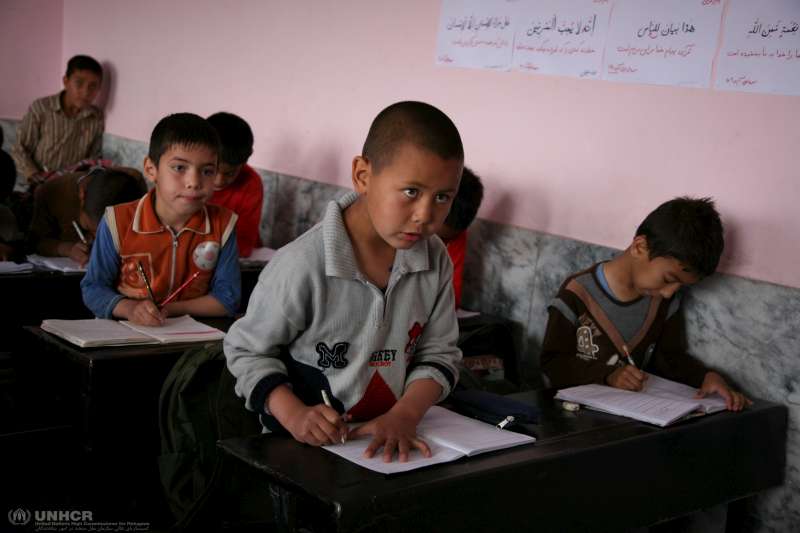Child Refugees With Disabilities in Iran Struggle to Access Education and Healthcare

JUNE 22, 2018
In interviews conducted by the Center for Human Rights in Iran (CHRI) ahead of this year’s World Refugee Day, June 20, 2018, several Afghan refugees in Iran described difficulties accessing basic services including health care and child education.
Refugees with disabilities, particularly children, are often excluded or denied the ability to obtain the limited state services currently provided by Iran.
An Afghan mother of a child with a disability told CHRI, “My child is not able to move and yet she does not qualify for any services and we have to pay for all her expenses.”
“They even took money from us to extend her residency card,” she added.
According to the UN Refugee Agency, Iran is among the top five countries hosting the highest number of refugees in the world with at least 3 million documented and undocumented Afghan refugees and 30,000 Iraqi refugees.
Based on Article 7 of Iran’s Refugee Regulations (1963), “A refugee, after being accepted for asylum can benefit from… health, cultural and social services.”
In 2015, Supreme Leader Ali Khamenei also issued a decree requiring all schools in Iran to admit Afghan children regardless of whether they were documented. International law also states that all children should be allowed access to primary and secondary education.
But hundreds of thousands of refugees in Iran remain out of school because they cannot afford to pay the fees for non-Iranians, or the schools simply don’t allow them to register.
Refugees can apply for health insurance based on agreements between Iran and the United Nations High Commissioner for Refugees but also face problems accessing health care in Iran.
Due to Iran’s reliance on UN funding for this service, there can be lapses in coverage availability when the UNHCR is not providing funding. Besides that, refugees must pay out-of-pocket initially and then apply for reimbursements that often don’t cover the total costs of the service.
“I spent 500,000 tomans (approximately $117 USD) to get insurance but it doesn’t even cover the cost of a doctor’s visit,” an Afghan refugee who asked not to be named told CHRI.
Refugees With Disabilities Face Extreme Hardships
Iranian laws do not require any particular services to be provided to refugees with disabilities and the new Law for the Protection of the Rights of Persons With Disabilities passed by Parliament in April 2018 does not mention refugees.
In October 2017, Mohsen Ghafourian, the training and rehabilitation assistant at the state-funded Special Education Organization, said more than 2,000 non-Iranian students, mostly Afghans, were enrolled in Iranian schools for the disabled in the September 2016-17 academic year.
No exact figures exist, but disability rights experts point out that the number of unregistered children with disabilities is much higher.
Speaking about the school enrollment process for non-Iranian students with disabilities, a disability rights expert told CHRI: “Afghan children are accepted into these schools with the same documents required by regular state schools. But there are always inexplicable problems like ‘lack of space in the classroom’ and when you are a disabled person, naturally, these excuses come up more often.”
In addition, Iran’s State Welfare Organization has failed to adequately provide for the needs of refugees with disabilities despite being the primary service provider tasked with implementing the UN Convention on the Rights of Persons with Disabilities, which Iran ratified in 2009.
A former employee of a non-governmental organization helping refugees in Iran told CHRI that the State Welfare Organization provides services to refugees with disabilities only when the UN High Commissioner for Refugees funds such projects.
“The Welfare Organization has contracts with the UN High Commissioner for Refugees to provide rehabilitation services, such as physiotherapy and occupational therapy, to refugees with disabilities. But, first of all, these contracts are for short terms of three to six months. Secondly, they cover a limited number of people in a few provinces. You need continuity in order to have effective rehabilitation services.”
In its May 2017 recommendations to the Iranian government, the Committee on the Rights of Persons with Disabilities (CRPD) expressed concern “about the absence of measures to guarantee that migrants, asylum seekers and refugees with disabilities are provided with appropriate support and reasonable accommodation in immigration.”
It also called on Iran to “Take measures to facilitate the protection of persons with disabilities in refugee camps, through measures such as accessible shelters, water and sanitation, education and health, evacuation during emergencies and rehabilitation.”
No comments:
Post a Comment